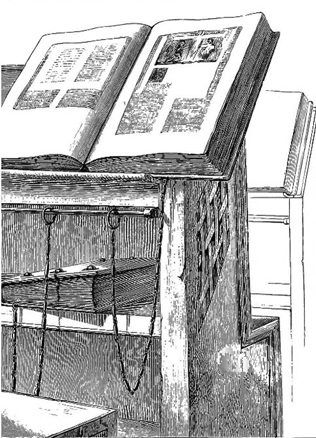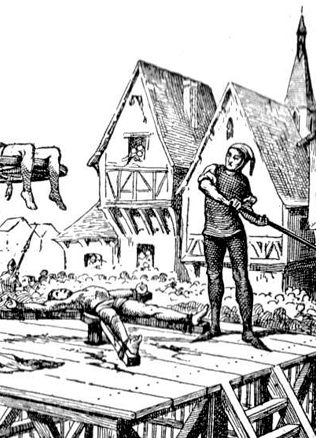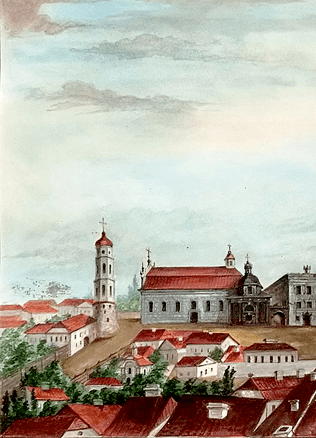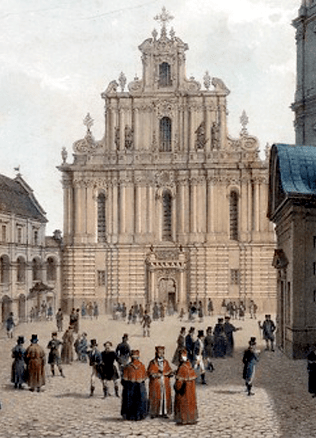Jonas Bretkūnas and the First Lithuanian Bible
Jonas Bretkūnas (Johannes Bretke, Bretkius), also known as Bretkus, was a Lutheran pastor, famous for his invaluable contribution to the development of the written Lithuanian language. Having translated the first Bible into Lithuanian and published the book of the earliest Lithuanian sermons, he was the first progeny of the authentic Prussian Baltic culture, which had been consistently developed and nurtured by the first refugees from Lithuania starting as early as in the 30-ies of the 16th century. Jonas Bretkūnas is known for the most significant legacy of the Lithuanian texts (about 5 000 pages of both printed and manuscript material have survived) It is not surprising, therefore, that he is referred to as the creator and developer of the Lithuanian literary language.
A Prussian speaking Lithuanian
In all likelihood, Jonas Bretkūnas, born in the village of Bambliai (Germ. Bammeln) near Friedland (Germ. Friedland, currently Pravdinsk), was of Prussian (who were still surviving in the 16th century) descent. In 1525, the German Order established the Duchy of Prussia in the lands conquered by the German invaders. Regardless of the cultural endeavours and initiatives inspired by the Renaissance epoch and Humanism, aimed at publishing Prussian books, the Prussian nation was doomed to go extinct. Living in the state ruled by Germans, many Prussians underwent a gradual process of assimilation and Germanization in the 16th century (Jonas Bretkūnas’ father, Valten Bretke, a craftsman and owner of a brewery and a fur shop, thus earning for a living and providing for his family, is believed to have undergone such a process), whereas the remaining part of Prussians underwent a different process of assimilation, that of Lithuanization. No historical data have survived testifying which language was spoken in Jonas Bretkūnas’ family, even though he is believed to have been born in the German-language environment (in the letter addressed to the Duke, written in 1563, Jonas Bretkūnas admitted that he had sufficient knowledge both of Lithuanian and Prussian). No historical evidence has survived about Jonas Bretkūnas’ writings in the Prussian language.
The very fact that Jonas Bretkūnas chose Lithuanian as his main language of writing, even though it was not his native tongue, is sufficient proof that the Lithuanian language occupied a strong position in Prussia in the second half of the 16th century.
Side by side with the German language, Lithuanian ranked as the second language to be used in the Eastern part of Prussia, both in terms of oral and written tradition. In 1555, Jonas Bretkūnas entered the Lutheran Königsberg University, the activities of which existed for a decade in the capital of the state and which is known to have hosted many Lithuanians. Having lost his mother, Jonas Bretkūnas is referred to as “a pauper and an orphan” (pauper, pupillus) in the University matricula (register). In 1557, left for the University of Wittenberg to continue his studies of theology, staying in Germany until 1562. After the “German” period in his life, Jonas Bretkūnas came back to |Prussia to take up the position of a priest in the Evangelical Lutheran parish of Labguva (Germ. Labiau, currently Polessk), assigned to him by the Duke of Prussia Albrecht von Brandenburg. The parish of Labguva was located at a distance of 4 km from the Curonian Lagoon. It was here that Jonas Bretkūnas held his local pastorate and produced his artwork during the period of 25 years. Even though the salary of the Prussian priests was paid from the treasury of the Duke of Prussia, their main income was to be obtained from the land granted to the priests and the farming activities. It is only natural that having dedicated all his life to science and studies, Jonas Bretkūnas did not find farming to his liking. He was also sick and tired of the disputes with the peasants, which were quite time-consuming, considering the fact that he had to supervise a landholding of about 63 hectares). To make things even worse, the land assigned under his supervision was often flooded. Jonas Bretkūnas kept requesting the Duke of Prussia to be appointed another parish. However, following the decision by the Semba Consistory, due to his knowledge of the local languages, Jonas Bretkūnas was not moved from Labguva for 25 years. He was the first pulpiteer to have preached to the local ethnic Lithuanians of the Ducal Prussia in the Lithuanian language, without the assistance of an interpreter. It was during his stay in Labguva, where Jonas Bretkūnas worked as a priest and was forced to become a farmer, that he started to translate the Bible into the Lithuanian language. He must have been working fast; from 1579 to 1580, the translation of the entire New Testament and the Psalm book was completed.
The quill that tamed the Lithuanian language
In 1587, after the Lithuanian priest Bartholomew Vilentas, a colleague of Martynas Mažvydas died, the position of a priest in St. Nicholas’ church in Steindamm, Königsberg, was left vacant. The Prince of Prussia Georg Friedrich appointed Jonas Bretkūnas to take up the vacancy. This created more favourable conditions to implement projects related to the publication of Bretkūnas’ Lithuanian books in Königsberg. In 1589, having revised and adjusted accordingly the first repertoire of the Lithuanian psalms, prepared as early as in Martynas Mažvydas’ times, Jonas Bretkūnas released two hymnals of his own (Giesmes Duchaunas ir Kancionalas) and a prayer-book Kolektas.
In 1591, the first ever in history significant treatise of Lithuanian religious prose, an original collection of sermons by Jonas Bretkūnas, called the Postilla, appeared.
The above mentioned four Lithuanian books were the only published pieces of writing by Bretkūnas. All of them attested Jonas Bretkūnas’ faithfulness to Lutheranism and his efforts to purify the doctrine and worldview of this Protestant Church.
Jonas Bretkūnas was also among the first Prussian historians: his treatise Chronikon des Landes Preussen (Chronicle of the Prussian Land) (1578–1579), written in German during his stay in Labguva, served in the 17th century as the basis for his great-grandchild Matthaus Pratorius (Matthew Praetorius), when the latter set about to write a historical treatise Deliciae Prussicae oder Preussische Schaubühne (The Peculiarities of Prussia, or the Prussian Schaubühne, around 1671–1703).
In November of 1590, when in Königsberg, Jonas Bretkūnas completed the major accomplishment of his lifetime, the translation of the Bible into the Lithuanian language, the project started during his stay in Labguva.
He was the first in the history of Lithuania to have practically realized the ideal of Reformation, namely, to present the Holy Scripture in the national language.
In the Grand Duchy of Lithuania, the first project of this kind was nurtured and implemented only a century later (by Samuel Boguslaw Chyliński (1631–1668), the translator and publisher of the first translation of the Bible into Lithuanian). The correspondence between Jonas Bretkūnas and the Duke of Prussia as well as with the government councillors regarding the checking of the manuscript of the Bible, consisting of eight volumes, and its preparation for publication. In 1600, Jonas Bretkūnas received a remuneration of 400 marks and a confirmation that the pre-print works of the Bible would start on the condition that the translator still updates the final version and undertakes the task of editing. In the end of October, 1602, after Jonas Bretkūnas passed away hit by the plague, which struck and ravaged Königsberg, all the pre-press works for the first Lithuanian Bible came to a standstill. Until World War II, the manuscript was preserved in Königsberg, to be taken to Germany at a later time. Today, it is stored in Berlin, in the Secret State Archives of the Prussian Heritage.
While translating the Bible, Jonas Bretkūnas remained faithful to the teaching of Martin Luther, therefore his main source of reference was the German Bible by Martin Luther (edition of 1546). Jonas Bretkūnas did his best to align the translation with the Latin Vulgate, the Greek New Testament and the passages from the Bible by Bartholomäus Willent, namely those taken from the Gospels and the Epistles (1579). He also used the work of the Bible commentators of Modern Times (such as Erasmi Roterodami and others). The manuscript of Jonas Bretkūnas abounds in possible versions of translation and synonyms of separate words and phrases.
No doubt, the translation of the Bible into the Lithuanian language, the written tradition of which was merely at the start of its formation, was a most demanding, a highly time and effort consuming project in the 16th century. Jonas Bretkūnas embarked on the path of accomplishing this most challenging task not supported by anybody, on his own will, taking it as the God’s calling: “God wants every man to take the burden upon himself according to his caste and calling, the burden which was entrusted to him by God and which he must use to the glory of God and ministration of his neighbour. I am acting accordingly, I have recognized the fact that I am obliged to the extent possible to follow and carry out the will of God.”
Literature: Ona Aleknavičienė (par.), Jono Bretkūno Postilė. Studija, faksimilė ir kompaktinė plokštelė, Vilnius: Lietuvių kalbos instituto leidykla, 2005.
Dainora Pociūtė



